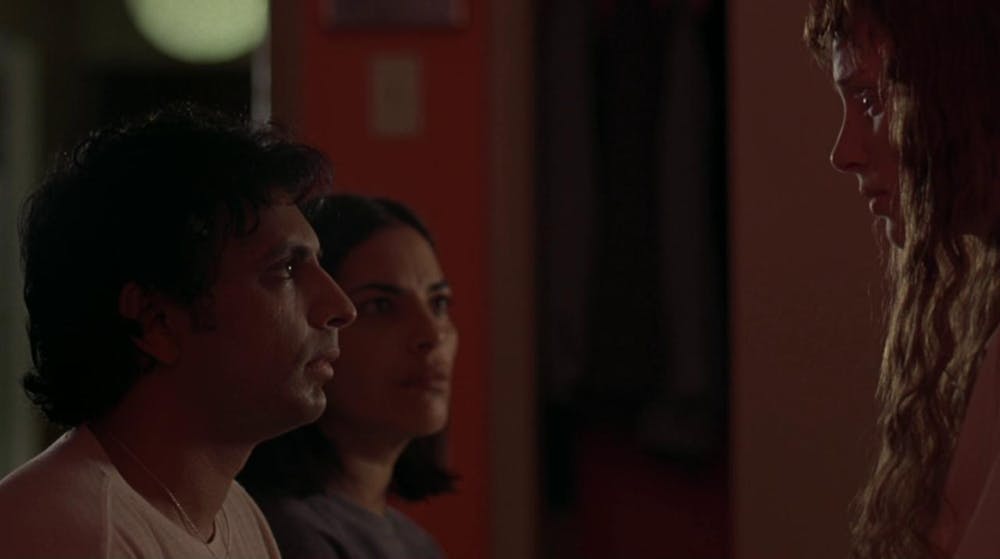In 1999, the same year he co-wrote “Stuart Little” and “She’s All That,” director Manoj Nelliyattu “M. Night” Shyamalan released a project at the complete opposite end of the spectrum: “The Sixth Sense.”
“The Sixth Sense” grossed $673 million, and received six Academy Award nominations: Best Picture, Director, Supporting Actor, Supporting Actress, Original Screenplay and Film Editing. Labeled “the next Spielberg” by Newsweek, Shyamalan seemed set for a career as Hollywood’s next golden boy. Hollywood, however, was not ready for M. Night.
Shyamalan’s follow-up to “The Sixth Sense” was another box office hit, the slow-burn superhero thriller “Unbreakable” (2000).
“Unbreakable” speaks volumes about Shyamalan's unique voice, style and presence in the film industry. Just before the rise of comic-book and superhero movies with Sam Raimi’s “Spider-Man,” Christopher Nolan’s “The Dark Knight” and the Marvel Cinematic Universe, Shyamalan tackles the genre in a much more subtle, character-driven and down-to-earth way — or as down-to-earth as superhero films can be.
For the rest of the 2000s, Shyamalan’s movies were grounded in the effects 9/11 had on society and explored our reactions to and relationship with the intense violence that exists in North America. Experimenting with how he did this led to less conventional filmmaking and story writing forms, and greater movies.
“The Village” (2004) was a renegade take on the period piece. Though its twist feels today like a classic “Shyamalanism,” at the time was seen as reductive and turned off audiences.
Shyamalan’s meditation on his worsening critical reputation through the story of a fairytale, 2006’s “Lady in the Water,” saw him up his usual cameo to a major role — a vulnerable and fourth-wall-breaking move.
What was meant to be a turnaround in his career only gained him more criticism. However, with “Lady in the Water” — for me, his first truly great film — he honed his ability to write fleshed-out, eccentric characters and shook the over-serious tone that was starting to take over his films.
“The Happening,” for its hilarious and offbeat acting and dialogue amid the film’s devastating “apocalypse,” is my favorite M. Night movie — Mark Wahlberg also gives the performance of a lifetime. However, in 2008, the film compounded his reputation as a “bad filmmaker,” made worse by the infamous “Avatar: The Last Airbender” (2010).
Unable to stay in the critics’ good graces, Shyamalan’s five-film run from “The Village” to “After Earth” (2013) killed his studio career. Not one was critically successful by any means — which I assure you, I would’ve never allowed if I was around and writing — and all five had different distribution companies.
Shyamalan’s movie-making days seemed close to their end. But — a magic “but” — in 2015, Shyamalan risked everything on “The Visit.” Taking a $5 million loan out on his house to make it, “The Visit,” a found-footage-style horror film about two siblings visiting their grandparents, grossed $98 million.
Thus began Shyamalan's renaissance.
With a new lease on life and filmmaking, Shyamalan spiraled into further visual excellence and splendor with his three 2020s films: “Old” (2021), “Knock at the Cabin” (2023) – for which The Eagle’s review is as “misguided” as the use of “little” in the title – and “Trap” (2024). The first two were fueled by his views on mortality in a post-pandemic world and the more personalized “Trap,” a concert film thriller he made in tandem with his daughter and singer-songwriter Saleka.
Despite the negative reception of many of his films, Shyamalan maintained his authority as a director. He continued to make movies how he wanted to, rejecting realism, crafting quirky characters, writing idiosyncratic dialogue, blending humor and personality with the violence and trauma in these films, making cameos and setting them in his home state of Pennsylvania.
Shyamalan tells empathetic stories of underdogs and people punished by life and the world, stories that would have otherwise gone unheard. Never talking down to his viewers or getting caught up in pretension, Shyamalan prioritizes a unique blend of profound themes, social commentary and stunning visual storytelling with good-old-fashioned “movie magic.”
What audiences and critics have done to his reputation should be one of American cinema’s greatest regrets; I only hope time is kind to his estranged filmography.
Regardless, he’ll keep doing his thing; being a genuine and original voice in today’s cinematic landscape.
Check out the “M. Night Shyamalan Ranked” list on our Letterboxd.
This article was edited by Marina Zaczkiewicz and Abigail Turner. Copy editing done by Luna Jinks, Ariana Kavoossi and Emma Brown.





